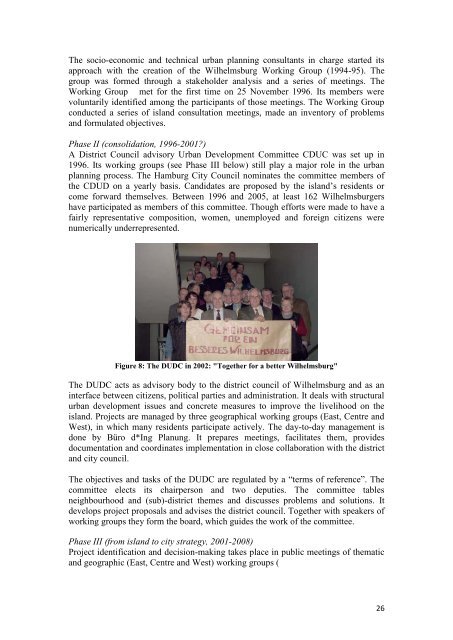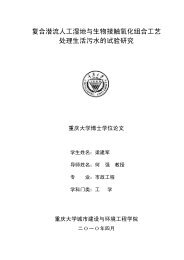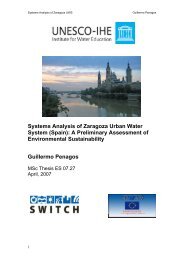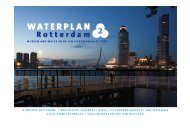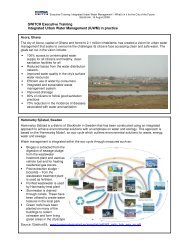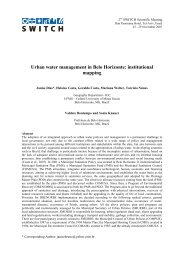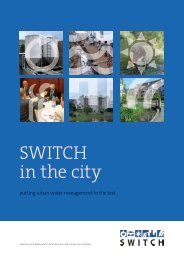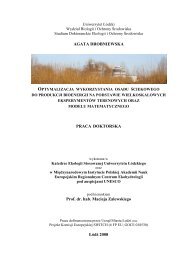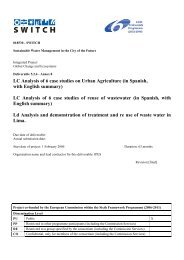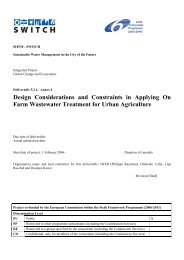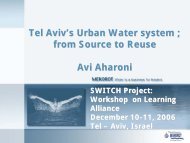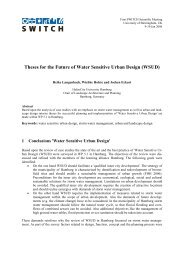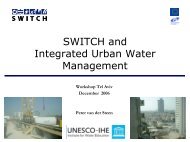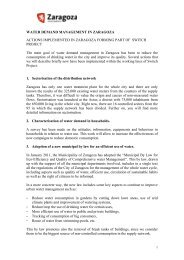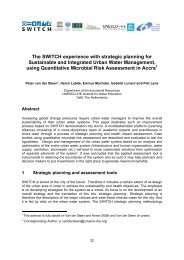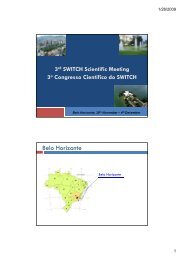Good practices for Social inclusion - Case studies and summary
Good practices for Social inclusion - Case studies and summary
Good practices for Social inclusion - Case studies and summary
Create successful ePaper yourself
Turn your PDF publications into a flip-book with our unique Google optimized e-Paper software.
The socio-economic <strong>and</strong> technical urban planning consultants in charge started its<br />
approach with the creation of the Wilhelmsburg Working Group (1994-95). The<br />
group was <strong>for</strong>med through a stakeholder analysis <strong>and</strong> a series of meetings. The<br />
Working Group met <strong>for</strong> the first time on 25 November 1996. Its members were<br />
voluntarily identified among the participants of those meetings. The Working Group<br />
conducted a series of isl<strong>and</strong> consultation meetings, made an inventory of problems<br />
<strong>and</strong> <strong>for</strong>mulated objectives.<br />
Phase II (consolidation, 1996-2001?)<br />
A District Council advisory Urban Development Committee CDUC was set up in<br />
1996. Its working groups (see Phase III below) still play a major role in the urban<br />
planning process. The Hamburg City Council nominates the committee members of<br />
the CDUD on a yearly basis. C<strong>and</strong>idates are proposed by the isl<strong>and</strong>‘s residents or<br />
come <strong>for</strong>ward themselves. Between 1996 <strong>and</strong> 2005, at least 162 Wilhelmsburgers<br />
have participated as members of this committee. Though ef<strong>for</strong>ts were made to have a<br />
fairly representative composition, women, unemployed <strong>and</strong> <strong>for</strong>eign citizens were<br />
numerically underrepresented.<br />
Figure 8: The DUDC in 2002: "Together <strong>for</strong> a better Wilhelmsburg"<br />
The DUDC acts as advisory body to the district council of Wilhelmsburg <strong>and</strong> as an<br />
interface between citizens, political parties <strong>and</strong> administration. It deals with structural<br />
urban development issues <strong>and</strong> concrete measures to improve the livelihood on the<br />
isl<strong>and</strong>. Projects are managed by three geographical working groups (East, Centre <strong>and</strong><br />
West), in which many residents participate actively. The day-to-day management is<br />
done by Büro d*Ing Planung. It prepares meetings, facilitates them, provides<br />
documentation <strong>and</strong> coordinates implementation in close collaboration with the district<br />
<strong>and</strong> city council.<br />
The objectives <strong>and</strong> tasks of the DUDC are regulated by a ―terms of reference‖. The<br />
committee elects its chairperson <strong>and</strong> two deputies. The committee tables<br />
neighbourhood <strong>and</strong> (sub)-district themes <strong>and</strong> discusses problems <strong>and</strong> solutions. It<br />
develops project proposals <strong>and</strong> advises the district council. Together with speakers of<br />
working groups they <strong>for</strong>m the board, which guides the work of the committee.<br />
Phase III (from isl<strong>and</strong> to city strategy, 2001-2008)<br />
Project identification <strong>and</strong> decision-making takes place in public meetings of thematic<br />
<strong>and</strong> geographic (East, Centre <strong>and</strong> West) working groups (<br />
26


